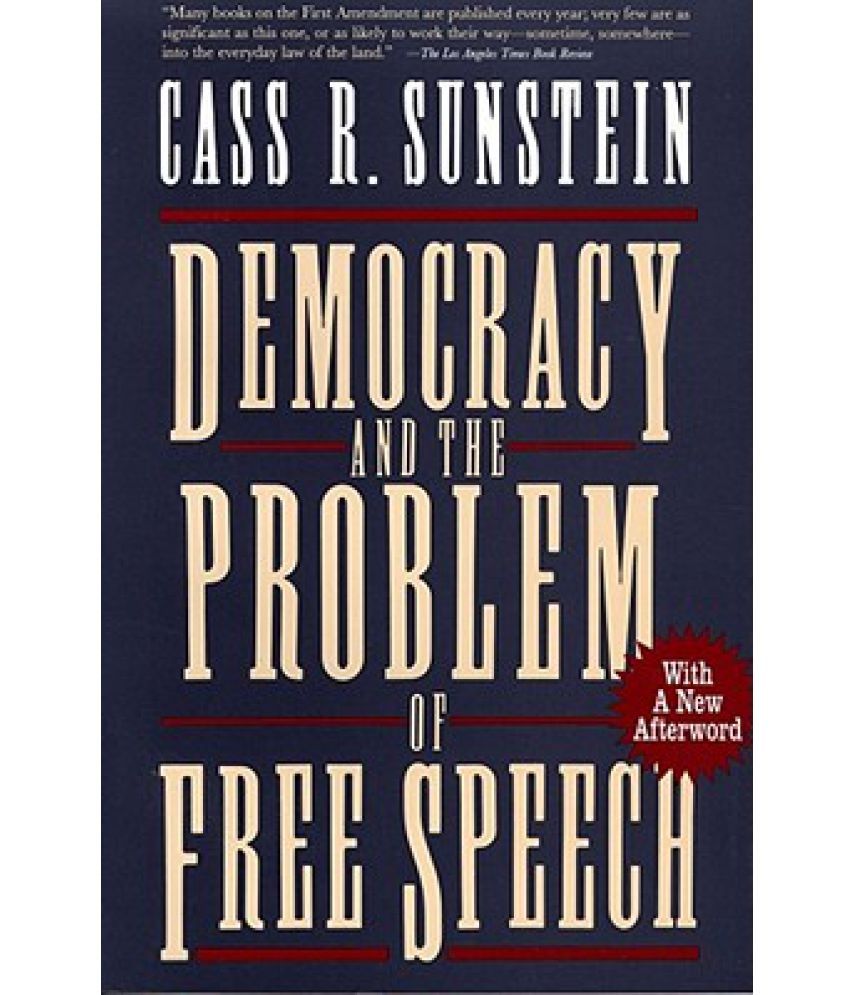Something went wrong. Please refresh the page and try again.
Something went wrong. Please refresh the page and try again.
Notifications can be turned off anytime from settings.
Item(s) Added To cart
Qty.
Something went wrong. Please refresh the page and try again.
Something went wrong. Please refresh the page and try again.
Exchange offer not applicable. New product price is lower than exchange product price
Please check the updated No Cost EMI details on the payment page
Exchange offer is not applicable with this product
Exchange Offer cannot be clubbed with Bajaj Finserv for this product
Product price & seller has been updated as per Bajaj Finserv EMI option
Please apply exchange offer again
Your item has been added to Shortlist.
View AllYour Item has been added to Shopping List
View AllSorry! Democracy and the Problem of Free Speech is sold out.


You will be notified when this product will be in stock
On the Back Cover
The right to free speech is invoked to protect an astonishing range of activities, a range that seems to expand every day. Newspapers publish the names of rape victims, flags are burned, pornography flourishes, and all of these controversial actions are protected under the constitutional right of free speech. The Supreme Court increasingly decides disputes by invoking the First Amendment. Civil libertarians, former antiwar protesters, and tobacco advertisers join revisionist conservatives in attacking almost all forms of censorship, extending the search to the farthest reaches of commercial and symbolic speech. In short, we are in the midst of a revolution of absolutist interpretations of free expression. The absolutists are misguided, argues Cass Sunstein. Our government now protects speech that causes harm yet forbids speech that is essential, he says. Instead, we should conceive of free speech first and foremost as a means to achieve civic deliberation and true popular sovereignty. Building on James Madison, Sunstein proposes a "New Deal" for the first Amendment, a new interpretation that attacks undifferentiated absolutism and replaces it with a vision of responsible public life. Sunstein examines broadcasting, campaign finance, hate speech, pornography, government art funding, commercial speech, and the privacy of rape victims. He insists that political speech, essential for the functioning of any democracy, must not only be protected, but encouraged. If the government, say were to use broadcasting markets to encourage attention to public issues and diverse points of view, the First Amendment would not stand in the way. Nonpolitical speech, on the other hand, should be less fullyprotected when it conflicts with other interests and rights such as that of privacy. Democracy cannot achieve its full potential with a stunted public discourse. Instant polls and 900 numbers may seem to increase political participation, but they are no substitute for reasoned and careful public deliberation. In Democracy and the Problem of Free Speech, Cass Sunstein points the way toward a renewal of American democracy and a reaffirmation of political equality.
About the Author
Cass R. Sunstein is Robert Walmsley University Professor at Harvard University, Massachusetts. From 2009 to 2012, he was Administrator of the White House Office of Information and Regulatory Affairs. He is the founder and director of the Program on Behavioral Economics and Public Policy at Harvard Law School. Mr Sunstein is author of many articles and books, including the best-selling Nudge: Improving Decisions about Health, Wealth, and Happiness (with Richard H. Thaler, 2008), Simpler: The Future of Government (2013), Why Nudge? (2014), Conspiracy Theories and Other Dangerous Ideas (2014), Wiser: Beyond Groupthink to Make Groups Smarter (2014), Valuing Life: Humanizing the Regulatory State (2014), Choosing Not to Choose: Understanding the Value of Choice (2015) and Constitutional Personae: Heroes, Soldiers, Minimalists, and Mutes (2015).
The images represent actual product though color of the image and product may slightly differ.
Register now to get updates on promotions and
coupons. Or Download App